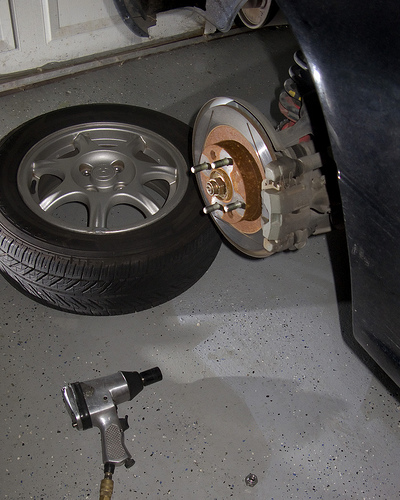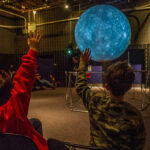Everybody has talent, it’s just a matter of moving around until you’ve discovered what it is. – George Lucas
What does that mean?
To me, he is saying “We’re all good at something.” The trick, he continues, is to figure out what it is. How many of you tried any number of things before you found something you were good at?
Was it board games (no good at Life, but great at checkers)? Perhaps playground games (no good at 4-square, but great at tag)? Or school work (no good at biology, but great at physics)? What about real life jobs (fair at washing dishes and cooking, but great at solving problems)?
What are you good at, what are your talents? How long did it take to find them? And, most importantly, do you think you have discovered all of them, or are there some still hiding from you? Do you want to try to discover them?
While I presume this quote was about finding a vocation, I am going to use it for pleasurable pursuits, trying to answer the question “What are you good at, that you also enjoy doing?”
Why is discovery important?
As far as I know, no one has been born who knows everything about themselves. Just look to those wonderful teenage years, if you need a reminder. So life is a journey of discovery. We discover who we are, what we believe in, what we like and dislike. And if we are robust in our journey of discovery, we never stop.
Imagine where you would be as a person if you had ever completely stopped discovering. If you stopped early enough, you might not be able to walk, read or write. Others might never have learned to swim, ride a bike or drive a car. What about literature and the imagination, where would they be if you had stopped discovering? Very few people are ever in this place, or at least not for more than a little while. To linger there would appear to be a very slow death of the spirit.
Many people are in a state of passive discovery, they don’t actively go out looking for new things, new experiences or new knowledge, but still it shows up from time to time and visits them. News stories about treatments for diseases, scientific discoveries or great accomplishments could be examples of this.
TV shows about great people, great adventures and odd animals. Even reading books, historical, fiction or even magazines; all can provide interesting bits of discovery. Do you know what tatting is and how it relates to other forms of fabric art? Really, it was on TV.
Some people are in a more active state of discovery, at least in some aspects of their lives. When was the last time you learned a new game (chess, go, checkers, Monopoly or Life)? A new skill (welding, juggling or wood working)? A new language (or worked at increasing the mastery of a language you are already familiar with)?
When was the last time you went and took on a physical challenge that you had no real idea how to properly do (skydiving, SCUBA diving or rock climbing)? Physical, mental, and spiritual are all aspects of discovery that can be pursued, are you looking for a new adventure?
Where can I apply this in my life?
What is often more interesting is active discovery. Make a list, not necessarily a “bucket list,” but a list of things that look like they’d be fun to do, fun to learn, useful to have in the old toolbox of life. Then look into where or when you might work a few of these new discoveries into your life.
Some will not be anywhere near as much fun as you thought, or will have tedious or expensive work to be done before you can get started. Others you may find you just can’t get the hang of, or are more scary or dangerous than you are comfortable with. You won’t know until you try. Ready to get started?
Have you ever said “Gee, that looks like it would be interesting to try to do!” and wondered about it? I have SCUBA diving on my list of things to do. How about you? Make a list of at least three things you have seen on TV, in a movie, read in a book or heard a friend talk about that you thought might be interesting to do.
Have you ever said “I wonder if I could do that?” about something you’ve seen on TV? I’ve done a little spelunking (climbing around in caves), but really want to do a cave with a waterfall. How about you? Make a list of at least three other things you have seen on TV, in a movie, read in a book or heard a friend talk about that you thought might be a challenge to do.
Have you ever seen something on TV and said “That is a lousy camera angle, and the lighting is bad – camera should have been over there and an extra light should have been over here!” and been fairly certain about it? I know I have. How about you?
Make a list of at least three things you have seen on TV, in a movie, read in a book or heard a friend talk about that you thought you could have done better. This could include camera work, acting, dialog writing, fight choreography, or anything else.
Have you ever said “Wow, that looks beautiful! I’ve got to go there” and wondered how you might get there? I’ve seen the Cliffs of Moher at sunset in the spring, and a sunrise from the edge of the crater of Haleakala. How about you? Make a list of at least three places you have seen on TV, in a movie, read in a book or heard a friend talk about that you really want to see in person.
At this point you should have quite a list of things to do, places to visit, and skills to learn. Pick one to start with, you can come back and try this with the others afterwards.
With the first discovery in front of you, come up with a strategy – a plan for what needs to be done. If it is to learn a foreign language, you will have to determine if you are going to learn from books, software & computer, a class or a tutor (or some combination of the above).
Then determine how much time you are willing to allocate, and determine when you are going to schedule this time. Is there money involved, probably. Determine what you can afford and what kind of payment schedule you might be able to make.
Language Software tends to be very expensive and paid up front, where a tutor usually is paid on a per session basis. You may find part way through the planning that the first choice isn’t going to work due to scheduling conflicts or cash flow issues. That’s fine, work around it.
Remember, this is a journey of discovery. You probably don’t have any real certainty that this is something you really want to do, so starting with small steps might be a better idea. Some language software can cost over $500, but a book on how to speak like a tourist in a foreign country might cost less than $25. Which is a more prudent manner to discover that you don’t like Italian or Spanish or Japanese? Just something to think about while planning.
Now that you have a plan, let’s figure out how to implement it. Check with the book stores (brick & mortar or web-based), the schools (community colleges or cultural groups), tutors and software to determine what is the path that is best for you to discover this new skill.
All that is left is to execute the plan. Recalling that few plans work out the way they were put down on paper, plan to be flexible. Tutors may flake out on you, the teacher in the class may rub you the wrong way, the book may be too dense or superficial for your use. Try it, be flexible, and discover if it is for you.
Repeat for the rest of the items on the lists you made. Hopefully, you will be adding to those lists. Have fun discovering new things, but beware, it can become an addiction!
Everybody has a talent (or two). For George, it meant staying out of the deep end (read his bio to find out why), but he discovered other things he could do, how about you?
From: Twitter, undocumented feed (my bad)
confirmed at: http://www.brainyquote.com/quotes/quotes/g/georgeluca340611.html
Photo by Robert Couse-Baker







